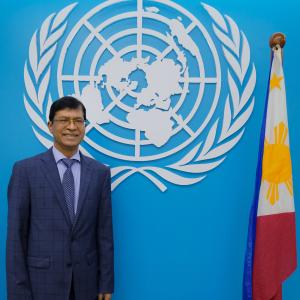REMARKS
Dr. Selva Ramachandran, UNDP Resident Representative
and UN Resident Coordinator, a.i. in the Philippines
at the occasion of
World Food Day 2024 Celebration
October 16, 2024, the Philippines
Colleagues from the UN Country Team
Our partners in development, distinguished guests and participants,
Mabuhay and a good day to everyone!
On behalf of the UN Philippines Country Team, I would like to extend our appreciation as we celebrate World Food Day.
This celebration is also an opportunity for reflection about the realities we face as a society about food – a basic necessity and right at the same time.
We are faced with striking paradoxes when we talk about food. Globally, there is enough food to feed the world’s population, yet 733 million people are hungry because of conflict, marginalization, climate change, poverty and economic downturns.
Furthermore, some 2.8 billion people – more than a third of the world’s population – cannot afford a healthy diet.
In most cases, these people are members of agricultural households – the very producers of food that the world consumes.
The UN’s latest State of Food Security and Nutrition in the World report notes that almost 51 million Filipinos consider themselves to be “food insecure”, and almost 6% of the population is undernourished. The country also remains impacted by postharvest losses in rice (16.5%) and corn (7.2%) – both key staples for Filipinos.
The theme of this year’s World Food Day – Right to foods for a better life and a better future – focuses on diversity, nutrition, affordability, accessibility and safety. A greater diversity of nutritious foods should be available in Filipino fields, fishing nets, markets, and on our tables, for the benefit of all.
Food security and proper nutrition are not just basic needs, but essential human rights. Ensuring everyone’s access to nutritious food is the foundation for healthier communities, a stronger nation, and a more sustainable future.
The journey toward a food-secure Philippines is a collective effort, requiring collaboration across sectors—government, civil society, and the private sector—supported by global cooperation.
This is why UN Philippines remains has committed to support the Philippine government in improving food and nutrition policies, access to healthy diets, and promoting climate resilient agriculture.
This commitment is reflected in the UN Sustainable Development Cooperation Framework that we signed with the government last year. The fundamental right to food cuts across the framework’s three strategic pillars (human capital, green economy, climate & environment) and is encapsulated in the country’s goal: stronger agri-food and social protection systems, resilient individuals and communities.
We are working closely with the government – one such example being the flagship “Walang Gutom 2027: Food Stamp Program”, an initiative backed by the UN through the Word Food Programme.
Diverse, nutritious, affordable, accessible, and safe foods are essential in developing our human capital as healthy diets cut across all economic sectors. Ensuring everyone’s access to nutritious food is especially key for the youth. As per commitments from the Pact of the Future, passed in New York last month, we need to empower our young people now so they can be on the frontlines and work towards a zero-hunger future.
A food-secure nation requires a strengthened agri-fisheries sector where access to modern technology is improved, market access is expanded, and sustainable jobs are created, among others. Economic transformation centered around a stronger agri-fisheries industry is our vision for a food-secure Philippines. Our colleagues from FAO, UNIDO and other agencies are working hand-in-hand with authorities at all levels, communities and individuals, towards strengthened agri-food systems to eliminate hunger and malnutrition.
We are committed to continue working with communities to develop climate-resilient agriculture and fisheries practices and adopt sustainable land use practices.
At the same time, we will support the government with nation-wide and systemic solutions that will tackle the evolving impacts of climate change. We are keen and committed to support localized and fully owned solutions that the Philippines can also proudly offer to other countries in the region and around the world through South-South and triangular cooperation channels.
I’ve only mentioned a few of the initiatives and approaches by the United Nations within the Cooperation Framework that will ultimately contribute to upholding the right to foods.
I am sure there is more that we can explore together and today is the perfect chance for us to go back to the drawing board and make sure we leave no one behind.
In closing, I would like to highlight that collective approaches (at country, regional and global levels) will be key to achieving a food-secure nation and world.
Once again, happy World Food Day! Maraming Salamat po!
***






